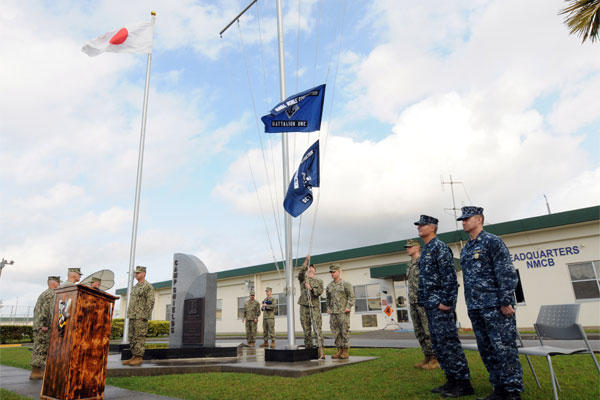The U.S. was in apology mode again Monday over the latest incident on Okinawa in which military personnel allegedly caused harm to Japanese civilians, fanning already strong anti-American sentiment on the island.
The Defense Department "deeply regrets" the accident Sunday in which an allegedly drunk U.S. Navy sailor drove the wrong way on a road and smashed head-on into two vehicles, injuring at least two Okinawa residents, Pentagon Press Secretary Peter Cook said.
"Obviously, this is a deeply concerning event that we wish had not taken place and we're all going to be cooperating with Japanese authorities fully in this investigation and in doing what we can to prevent these kinds of things from ever happening again," Cook said at a Pentagon briefing.
Petty Officer 2nd Class Aimee Mejia, 21, who was assigned to the Kadena Air Force Base on Okinawa, was arrested by Okinawa police who recommended Monday that she be charged with "dangerous driving resulting in injuries." If convicted, Mejia could face a maximum sentence of 15 years under Japanese law.
U.S. service members on Okinawa were already under a ban against off-base drinking when the accident occurred and a breathalyzer test showed that Mejia's blood-alcohol level was 0.18 -- six times the legal limit in Japan, local police said.
In response to the incident, Foreign Minister Fumio Kishida once again summoned U.S. Ambassador Caroline Kennedy to his office to demand that the U.S. do more to control the behavior of U.S. service members and civilian employees working at American bases in Japan.
Last month, Kishida called in Kennedy following the discovery of the strangled and bludgeoned body of 20-year-old Rina Shimabukuro, which was dumped in a wooded area near the Kadena base.
Kenneth Franklin Gadson, 32, a former Marine now working as a civilian contractor at Kadena, was arrested on suspicion of dumping the body. Gadson, who now goes by his wife's last name of Shinzato, was expected to face other formal charges.
The killing of the young woman overshadowed President Barack Obama's visit to Japan last month during which he sought to strengthen military ties and also made the first visit by a sitting U.S. president to Hiroshima, site of the atomic bombing in 1945.
At the outset of the visit, with Obama standing at his side, Prime Minister Shinzo Abe said that Shimabukuro's death "shocked all of Japan" and "I have firmly lodged a protest against President Obama as the Japanese Prime Minister with regard to the most recent case in Okinawa."
Following the alleged drunk driving incident on Okinawa, Vice Adm. Joseph Aucoin, commander of the 7th Fleet, and Rear Adm. Matthew Carter, commander of U.S. Naval Forces Japan, issued orders restricting liberty and banning the consumption of alcohol for all officer and enlisted Navy personnel in Japan.
"These measures are not taken lightly," Carter said in a statement. "For decades, we have enjoyed a strong relationship with the people of Japan. It is imperative that each sailor understand how our actions affect that relationship, and the U.S.-Japan Alliance as a whole."
"Effective immediately, sailors are prohibited from drinking alcohol on and off base. Additionally, all off-base liberty will be curtailed. Sailors who live off base will be permitted to travel to and from work and engage in official actions such as childcare drop-off and pickup, trips to the grocery store, gas stations or the gym," the order said.
"The liberty curtailment will remain in effect until face-to-face training has been conducted by unit commanding officers, executive officers and command master chiefs with all personnel," the order said.
The alcohol restriction was to remain in effect until Aucoin and Carter "are comfortable that all personnel understand the impact of responsible behavior on the U.S.-Japan Alliance and the United States' ability to provide security and stability in the Indo-Asia-Pacific," the order said.
The U.S. currently has more than 50,000 military personnel in Japan, about half of them on Okinawa. Defense Department figures from last September showed that the Navy had about 22,000 personnel in Japan, the Marine Corps 15,700, the Air Force 12,000 and the Army 2,400. There were also about 4,700 military dependents living in Japan.
That's in addition to the roughly 8,500 direct-hire civilian employees of the department working and living in the country with their dependents, according to the figures.
The death of Shimabukuro and the alleged drunk driving crash were believed to have been factors in local elections on Okinawa on Sunday in which opponents of the U.S. military presence increased their majority in the prefectural assembly.
Many of the candidates campaigned against the long-stalled relocation of the Marine Air Station at Futenma to the less-populated northern part of the island in the Henoko district.
Okinawa Gov. Takeshi Onaga, a staunch opponent of the relocation, said "The election showed that the people of Okinawa support efforts to stop the construction of a new base."
Since Shimabukuro's death, local newspapers have also published articles purporting to show that Okinawans have long had to deal with crimes committed by U.S. military and civilian personnel.
The Okinawa Times reported last month that 5,862 U.S. military personnel and civilian employees had been arrested between 1972 and 2014 -- 737 of them for serious crimes, including murder, rape, burglary and arson.
--Richard Sisk can be reached at Richard.Sisk@Military.com.




























